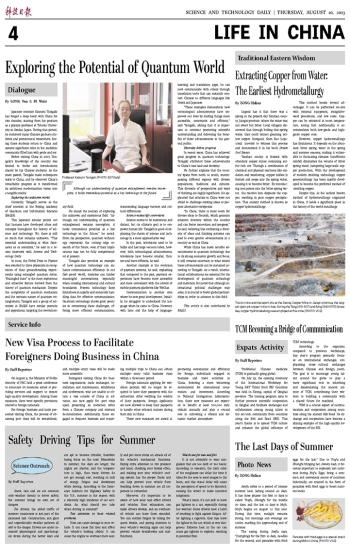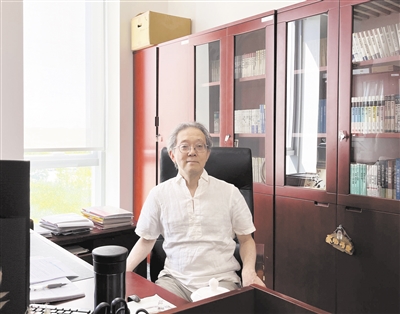
 |
| Professor Katsumi Tanigaki. (PHOTO: S&T Daily) |
Japanese scientist Katsumi Tanigaki has forged a deep bond with China for two decades, starting from his position as a physics professor at Tohoku University in Sendai, Japan. During that period, he mentored many Chinese graduate students and postdoctoral researchers. Seeing these students return to China and assume significant roles in the academic community filled him with pride and joy.
Before visiting China in 2007, Tanigaki's knowledge of the country was limited to books and introductions shared by his Chinese students. As the years passed, Tanigaki made subsequent visits to China, and he observed China's remarkable progress as it transformed its ambitious modernization vision into a tangible reality.
Exploring the unknown world
Currently, Tanigaki serves as the chief scientist at the Beijing Academy of Quantum and Information Sciences (BAQIS).
This Japanese scholar points out that humans have developed ideas and concepts throughout the history of science and technology. Yet, there is still so much that remains unknown. "This essential understanding is what fascinates us as scientists," he said in a recent interview with Science and Technology Daily.
In 2022, the Nobel Prize in Physics was awarded to three physicists in recognition of their groundbreaking experiments using entangled quantum states. "Entangled state" is the most mysterious and attractive feature derived from the theory of quantum mechanics. Despite the complexity of quantum mechanics and the intricate nature of quantum entanglement, Tanigaki and a group of scientists at BAQIS have similar pursuits and aspirations, targeting the revolutionary field.
He enjoys the journey of exploring the unknown and mysterious field. "Although our understanding of quantum entanglement remains incomplete, it holds tremendous potential as a key technology in the future," he noted. From his perspective, quantum technology represents the cutting-edge research of the future, even if their implications may not be fully comprehended at present.
Tanigaki also provides an example of how quantum technology can enhance communication efficiency. In our fast-paced world, mistakes can hinder meaningful conversations, especially when crossing international and cultural boundaries. Present technology faces limitations in rapidly and accurately handling data for effective communication. Quantum technology shows great promise in overcoming these challenges, offering more efficient communication, transcending language barriers and cultural differences.
Science makes life convenient
Science seems to be mysterious and distant, but its ultimate goal is to empower human life. Tanigaki is good at explaining the charm of science and technology in a more approachable way.
In the past, televisions used to be bulky and had large vacuum tubes, however, with technological advancements, televisions have become smaller, thinner and more efficient, he said.
Another example is the evolution of payment systems, he said, explaining that compared to the past, payment experiences have become more accessible and more convenient with the advent of mobile payment platforms like WeChat.
Communication is another area where he sees great development. Initially, he struggled to understand the language when he came to China. However, with time and the help of language-learning and translation apps, he can now communicate with others through translation tools that can instantly convert Chinese to different languages like Greek and Japanese.
"These examples demonstrate how technological advancements have improved our lives by making things more accessible, convenient and efficient," said Tanigaki, adding that it is important to continue promoting scientific understanding and delivering the benefits of these advancements to the general public.
Diversity drives progress
In recent years, China has achieved great progress in quantum technology. Tanigaki attributed these achievements to China's vast land and diversity.
He further explains that the country spans from north to south, encompassing different regions with diverse populations, traditions and cultures. This diversity of perspectives and ways of thinking are highly significant. He applauded that scholars in China were not afraid to challenge existing ideas or propose alternative viewpoints.
"In China, there is more room for diverse ideas to flourish, which generate inherent diversity within the country and can foster innovation and progress," he said, believing that embracing a diversity of ideas and thinking patterns can lead to even greater advancements in a country as vast as China.
While China has made notable advancements in quantum technology due to its strong economic growth and focus, it still remains uncertain to what extent these advancements can be sustained according to Tanigaki. As a result, international collaborations are essential for the development of quantum technology and materials. He noted that although international political challenges may arise, it is crucial to foster global partnerships in order to advance in this field.
This article is also contributed by BAQIS.







